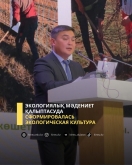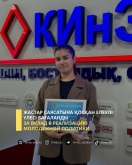Professional practice
The volume of all professional practices in bachelor and master programs in the scientific and pedagogical field should be at least 6 credits; in the master program by the specialized direction at least 2 credits.
Professional practice is divided into the following types:
– educational (computational, research, educational and informational, etc.). Organized on the 1st year of study. The duration of the practice is usually 2 weeks (in accordance with the work curriculum);
– pedagogical practice is conducted on each year of study during the entire period of students study and includes:
1) teaching practice of the 1st year students;
2) psychological and pedagogical practice of the 2nd year students;
3) educational and pedagogical practice of the 3rd year students;
4) industrial teaching practice of the 4th year students;
– work experience internship – is organized starting from the 2nd year of study, up to the graduation of students;
– Pre-graduation practical training is held at the graduation year of study for students of all specialties, who according to the individual curriculum perform the thesis (project). The duration of pre-graduation practical training is determined by the number of credits allocated for writing a thesis (project) in accordance with the state compulsory standard of higher education.
– research practice provided for master students with the aim of developing the skills of research work, gaining experience for independent theoretical training.
Each academic hour of practice (except educational) is accompanied by the corresponding number of student’s hours of additional work: 1 hour for pedagogical practice, 4 hours for work experience internship, and 7 hours for research practice.
The duration of the practices is determined in weeks based on the standard work time of the student in practice for a week of 30 hours (6 hours a day with a 5-day working week). To calculate the number of weeks, the amount of practice in credits is multiplied by the laboriousness of the corresponding type of practice in training hours and divided by the duration of the student’s work in practice during the week, that is, 30 hours.
The workload of 1 credit is 15 hours (50 minutes each) for educational practice, 30 hours (50 minutes each) for pedagogical practice, 75 hours (50 minutes each) for work experience internship. The duration of practice for 1 credit per week is: 0.5 weeks for educational practice, 1 week for pedagogical practice, 2.5 weeks for work experience, internships, 3.5 weeks for research practice.
On specialties with reduced educational programs only pedagogical, industrial and pre-graduation practical training are conducted.
Content of professional practice
1 The purpose of educational (familiarization) practice of higher educational institutions students is the acquisition of primary professional competencies, including the consolidation and deepening of theoretical knowledge gained in the learning process, obtaining the first research skills, skills of conducting business correspondence, the acquisition of practical skills in accordance with the specialty learning.
The main objectives of educational (familiarization) practice are:
1) familiarization with the main activities of the higher education institution;
2) familiarization with the specialty and its educational programs;
3) general familiarity with the organizational and legal form, structure, management system of organizations that are the objects of a future profession;
4) the study of the types, functions and tasks of future professional activities;
5) the study of business correspondence and the introduction of office work;
6) the acquisition of skills in the workplace.
Depending on the specifics of a subject area and the professional competence of the future specialist, there are study, field, excursion, route, school, computing and other types of educational practice.
Educational (familiarization) practice is conducted in a higher educational institution with introductory excursions to organizations that are objects of future professional activity.
The program of educational practice is developed in accordance with the requirements of the educational program and the profile of the specialty.
2 The purpose of pedagogical practice is to consolidate and deepen knowledge in general scientific, cultural, psychological and pedagogical, methodological and special disciplines, as well as the formation of pedagogical skills and competencies based on theoretical knowledge.
The main objectives of pedagogical practice are:
1) the acquisition of the initial experience of teaching;
2) mastering the methodology of teaching and learning;
3) basic knowledge of pedagogical skills;
4) inculcation of skills and abilities of independent conduct of educational and teaching work;
5) mastering the skills of scientific, psychological and pedagogical research;
6) mastering the methodology of educational work;
7) knowledge of innovative learning technologies;
8) the implementation of an individual approach to students in the course of educational work, taking into account the characteristics of their development.
Pedagogical practice includes: pedagogical, psychological-pedagogical, educational -pedagogical and industrial-pedagogical practices.
Pedagogical practice is continuous and is conducted in parallel with the theoretical training.
The base of pedagogical practice are:
1) pre-school organizations;
2) general education organizations (primary, basic secondary, general secondary);
3) the organization of technical and vocational education.
The program of pedagogical practice is developed in accordance with the requirements of the educational program of the specialty and is aimed at developing students’ professionally significant skills and the formation of the pedagogical competencies of the teacher.
3 The purpose of work experience internship is to consolidate professional competence, the acquisition of practical skills and professional experience.
The main objectives of work experience internship are:
1) the study of the professional activity types in the specialty, their functions and tasks;
2) consolidation of theoretical knowledge and the formation on this basis of professional skills, abilities and competencies;
3) mastering innovative technologies, advanced methods of labor and production; 4) the acquisition of organizational and professional experience;
5) the acquisition of teamwork skills, competencies of corporate management principles;
6) mastering the skills to independently plan their activities, to establish useful contacts with colleagues, to determine the role of professional position, to form a sense of responsibility.
The program of work experience internship is developed in accordance with the requirements of the educational program of the specialty and should be aimed at developing students’ professionally significant skills and the formation of special competencies in accordance with the requirements of professional standards.
4 The purpose of the pre-graduation practical training is to complete the writing of the thesis (project).
The main tasks of pre-graduation practical training are:
1) collection, processing and synthesis of practical material on the topic of the thesis (project);
2) analysis of statistical data and practical material on the topic of the graduate study;
3) the formulation of conclusions, patterns, recommendations and proposals on the topic of the thesis (project);
The content of pre-graduation practical training is determined by the theme of the thesis (project).
- Specialties
- - Computer technology and software
- - Standardization and Certification (by industry)
- - Technology of processing industries
- - Thermal Engineering
- - Automation and control
- - Mechanical engineering
- - Transport, transport equipment and technology
- - Electric Power Engineering
- - Logistics (by industry)
- - Organization of transport, traffic and transport operation
- - Agricultural Engineering and Technology
- - Robotic systems
- - Agronomy
- - Management
- - Accounting and Auditing
- - Finance
- - Economics


 Банк идей
Банк идей











